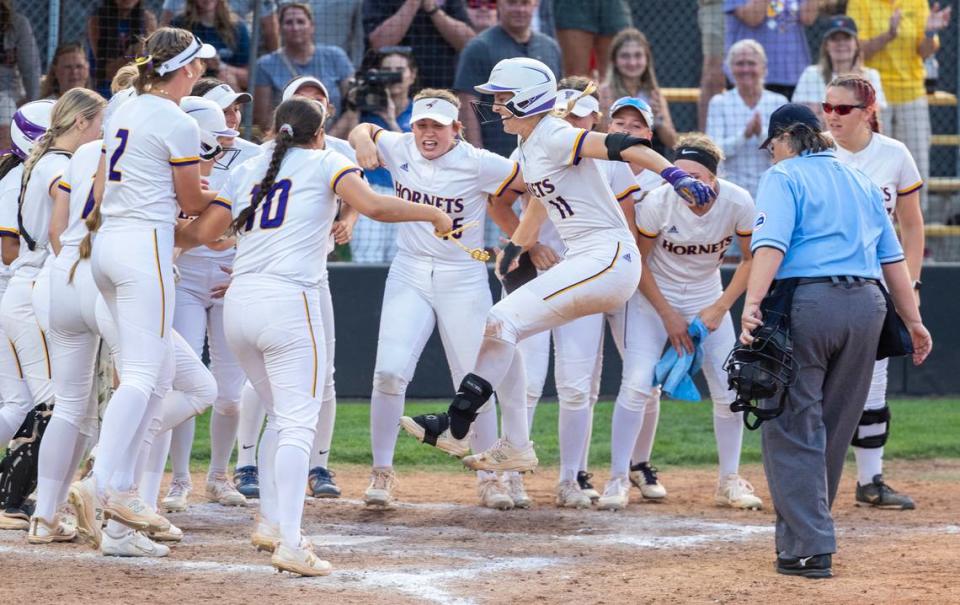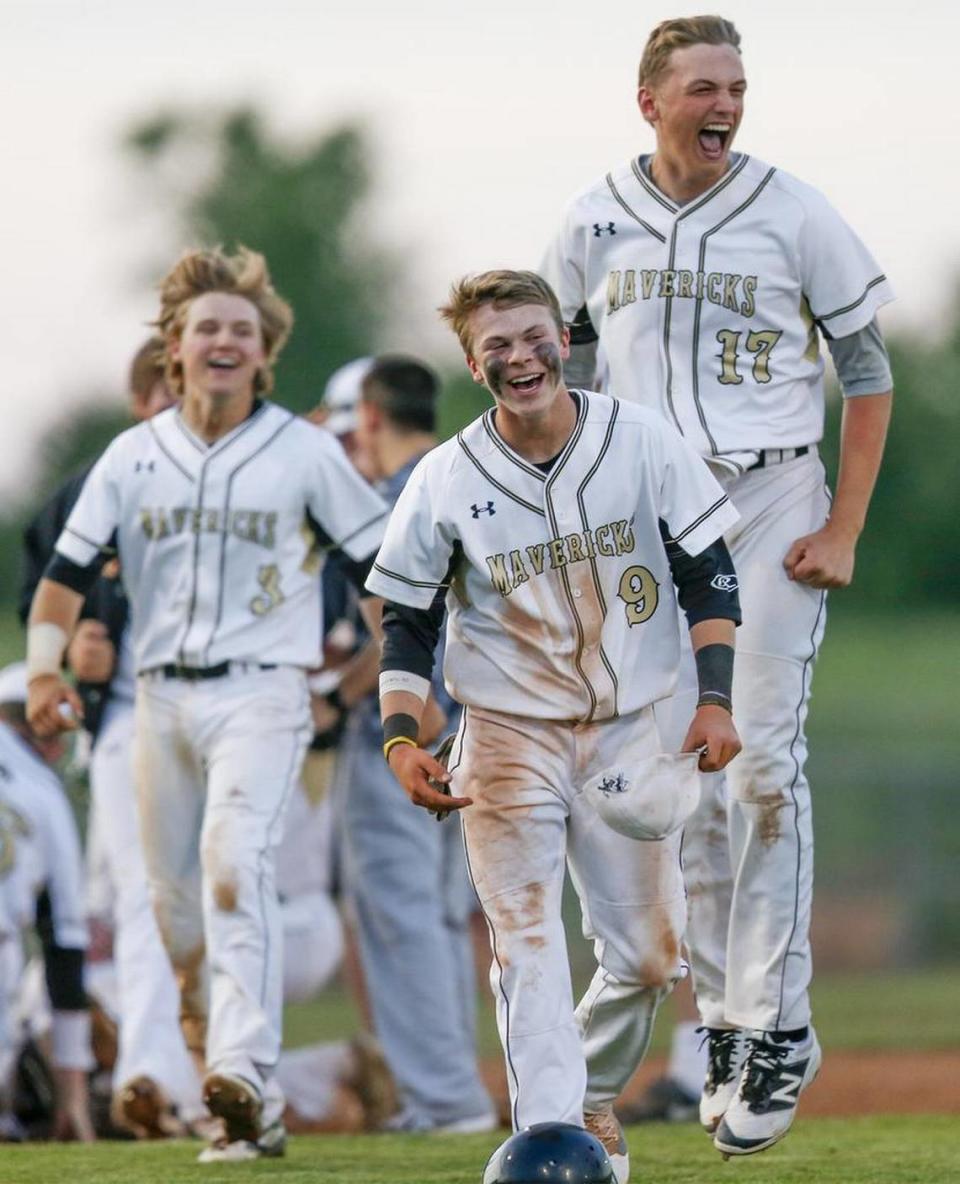Kansas high school baseball coaches celebrate KSHSAA vote to allow more scheduled games
Kansas high school baseball coaches celebrated a “first” step forward for their sport after the KSHSAA Board of Directors greenlit their proposal on Wednesday to expand the amount of games played in the regular season.
Varsity teams can now schedule up to 26 regular-season games, effective immediately, up from the maximum of 20 that has stood since 1965.
The proposal received 87% approval from the 170 baseball coaches around the state who voted in the fall of 2021, as they wanted to see Kansas close the gap of games played with teams in Oklahoma, Missouri and Nebraska, neighboring states that allow their teams to play more than 30 regular-season games.
After the proposal was narrowly shot down by the KSHSAA Board of Directors in the spring, the same proposal passed without much opposition on Wednesday.
“I think we would all love to get even more games, but this is a starting point,” Maize coach Rocky Helm said. “This is great news to give Kansas kids an opportunity to catch up with the surrounding states.”
“We’re definitely not where we want to be yet, but without expanding the season, 26 games had to be the first step in the right direction,” said McPherson coach Heath Gerstner, who doubles as the president of the Kansas Association of Baseball Coaches. “We’re making a positive change for kids in our state, so this is a great thing and a great day.”

Adding softball key in proposal passing in Kansas
Baseball coaches suspected the main reason why their proposal faltered in April was because administrators were hesitant to allow baseball players to play more games without affording the same opportunity for softball players.
After the baseball-only April 27 vote came up short, 33 to 32, the Kansas Association of Baseball Coaches worked with the Kansas Softball Coaches Association to make sure softball would be included in the next vote.
The shift in attitude was clear from the KSHSAA Board of Directors, which passed the baseball vote, 42 to 17, and the softball vote, 48 to 11, without much resistance a little less than five months later.
While softball coaches weren’t clamoring for more games like the baseball coaches, they also like the new reality of extra games.
“I think most softball coaches are on board with it and they’re excited about it,” Valley Center softball coach Corey Jones said. “It gives our girls more games, more playing time and you’re not missing much more school because the games are in the evenings.”
Because the under-handed throwing motion used in softball is more natural than the over-handed baseball throwing motion, there isn’t the same concern about the extra innings of pitching in softball.
Jones says only minor adjustments will need to be made for softball teams.
“There’s going to be some weeks where you play three doubleheaders in a week now and teams aren’t used to that,” Jones said. “I think you’re going to have to practice a little differently if you’re going to be playing 26 games and get your pitcher’s arms in shape.”

More games give coaches chance of getting creative with scheduling
In the City League, where the nine member teams play a round-robin, doubleheader schedule, teams only have the flexibility of controlling four games on their schedules each year.
Bishop Carroll has won 11 of the last 13 league titles and have often won games in run-rule fashion, which has further limited their repetitions in the field, on the mound and at the plate.
Given six additional opportunities to schedule games, Carroll coach Charlie Ebright and athletic director Tyler Fraizer were already hard at work on Wednesday evening to take advantage of their new flexibility.
“I’ve already reached out to the 6A champions, Blue Valley West, because that game should happen, right?” Ebright said. “6A champions against the 5A champions. I’d love to get some KC-area teams down here and my athletic director is already talking about maybe throwing together a tournament down at Riverfront Stadium to build some excitement. You can imagine what that can do for our strength of schedule and really help prepare us by seeing better pitching and better competition. You get tested, you get stronger.”
Teams can schedule up to three extra doubleheaders throughout the season, but a popular idea brewing among coaches of top programs is to capitalize on the opportunity by creating high-level tournaments with teams from all over the state.
Tournaments would be preferred over standalone games or doubleheaders because gathering multiple competitive teams in one location would make it more attractive for college scouts to attend.
“We’re not where we need to be yet, but this is a big step forward for our kids to give them more experience and make them more marketable for colleges,” Maize coach Rocky Helm said. “And this is going to give schools some opportunities to do some outside-of-the-box things to give college coaches a chance to come and watch a lot of teams at once. I’m excited to do that.”

More games, less practice equals better product, coaches say
More than other sports, baseball coaches believe their game is one of repetition and should be played more than practiced.
That has never been the case in Kansas.
“It seems like it’s practice, practice, practice, play, then practice, practice, practice, practice,” Trinity Academy coach Josh Robertson said.
“When you think about it, kids are sometimes only putting on a uniform 10 times during the regular season,” Carroll coach Charlie Ebright said. “Sometimes we practice six days a week and only play once. That’s not really how baseball is supposed to be played.”
There was some concern from administrators who voted against the proposal in April about adding games without expanding the length of the regular season, which could cause issues for teams lacking pitching depth.
Coaches argue not all teams have to play the extra games, but also the extra innings could be used as opportunities to build pitching depth during the season.
Over the course of four years, a player entering high school now could play up to 24 extra regular-season games — more than an entire season in the past.
“From a development standpoint, now you’re talking about a ton more at bats, a ton more reps in the field, a ton more chances to compete on the mound,” Lawrence coach Brad Stoll said. “I think it’s awesome for Kansas high school baseball players.”
“The more game experiences you can get, the better player you will become,” added Robertson, who has also worked in front offices of professional baseball teams.
While the Wichita metro area teams will likely be fine on the mound, programs with low numbers could potentially run into issues with the pitch-count rule if they decide to play extra games.
Under the KSHSAA pitch-count rule, if a pitcher throws between 46 and 60 pitches, two days of rest is required; between 61 and 75 pitches requires three days of rest; while between 76 and 105 pitches requires four days of rest.
“That’s something where we might have to look at adjusting,” Robertson said. “I don’t think any coach would abuse the rule if they care about their player and loves the game of baseball. They’re not going to destroy somebody’s arm.
“But if you’re playing three doubleheaders in a week, you could run into some problems if you’re short on arms. Maybe it’s something where we make it flexible depending on how many games you’re scheduled to play that week. Or maybe it’s just a hard-line rule change. Everybody’s situation is going to be different, but we’re talking six more games over the course of three months. So that’s one extra doubleheader a month. It’s not life-altering.”


